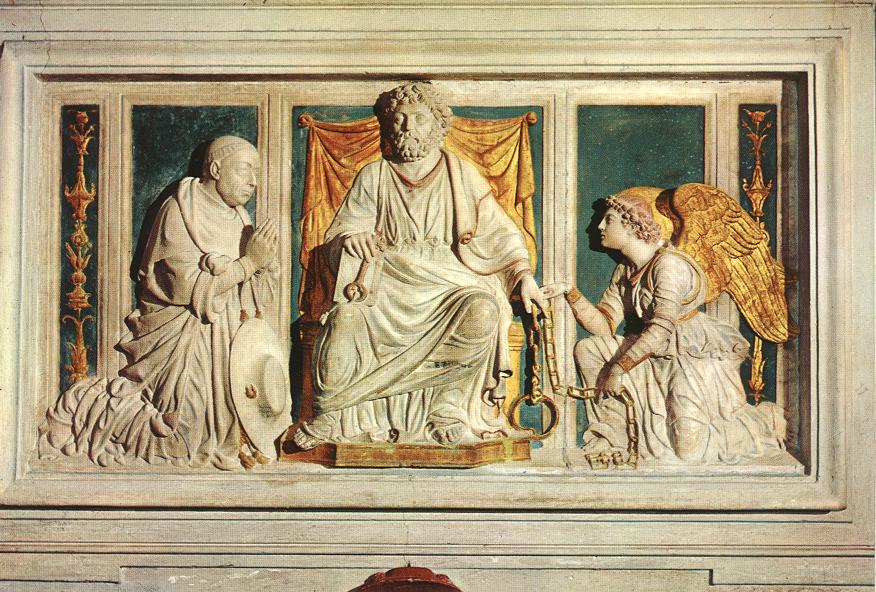First Steps to the Renaissance

Nicholas of Cusa
(1401 - 1464):
About 1431, Nikolaus von Cusa established by internal evidence that the document known as the
Donation of Constantine , for at least six hundred years the foundation of the Pope's political claims, could not have had the antiquity it purported. But he did not "publish" this result. In 1440 Lorenzo Valla made
public that the document was a fraud.
In 1440, Cusa, in De docta Ignorantia , said that the Truth can neither be increased nor diminished and that Intellect, or Reason, can never completely comprehend Truth. But "the more deeply we are instructed in this ignorance, the closer we approach the truth"
What is so profound and important about the
following idea?
Reason (meaning abstractive and discursive knowledge) is the faculty which abstracts universal concepts; it never arrives at perfect unity. The
knowledge of reason, moreover, is deficient because it represents reality in an improper manner, for it is only founded on individual beings.
Hence it follows that concepts result from contradictory notes, for instance, unity and multiplicity, being and non-being. The principle of contradiction, the basis of Aristotelian Scholastic logic, is good within the limits of reason, but it gives us an improper knowledge of reality. |
Concerning Measurement:
you will recognize that the art of calculating lacks precision, since it presupposes that the motion of all the other planets can be measured by reference to the motion of the sun. Even the ordering of the heavens --with respect to whatever kind of place or with respect to the risings and settings of the constellations or to the elevation of a pole and to things having to do with these-- it is not precisely knowable. Since no two places agree precisely in time and setting, it is evident that judgments about the stars are, in their specificity, far from precise |
Major Accomplishments of Cusa:
The suggestion by Nicholas de Cusa (c.1430) that the Earth might not be stationary, was supported by Leonardo da Vinci (c1490), who amongst many (!) other things also suggested the Earths moves (rather than the Sun).
He also wrote:
"To people elsewhere, the Earth would appear to them as a noble star"
 Clearly at serious odds with the dominant Ptolemaic cosmological ideas.
Clearly at serious odds with the dominant Ptolemaic cosmological ideas.
And further suggested:
- The universe has no beginning or end
(so is infinite in time, not necessarily in space).
- a theory of everything is not possible since the universe is infinitely complex. There is no absolute truth -- knowledge can only be a series of (hopefully better) approximations to reality.
However, this "new" way of thinking about a complex and many world Universe did
not appear out of nowhere. Remember that Lucreitus already discusses this 1500
years ago.
In addition:
[It] must be realized that while another world than this is not possible
naturally, this is possible simple speaking, since just as God made this
world, so he could have made several worlds. - Jean Buridan, rector of the University of Paris circa 1325)
Life, as it exists on Earth, in the form of men, animals and plants, is to be found, let us suppose, in a higher form in the solar and stellar regions. . . . Of the inhabitants then of
worlds other than our own we can know less, having no standards by which to appraise them. It may be conjectured that in the Sun there
exist solar beings, bright and enlightened denizens, and by nature, more spiritual than such as may inhabit the Moon - who are possibly lunatics . - Cusa
|
Cusa was lucky enough to espouse his theories prior to the Inquisition
really kicking in bigtime.
Key Paradox  Changes in social/governmental structure will simultaneously enable
science yet punish those who practice it.
Changes in social/governmental structure will simultaneously enable
science yet punish those who practice it.
The Reformation (e.g. Martin Luther), begin in earnest around 1510 (and lasts until 1563)
While this is largely a complex religious issue (Catholics vs Protestants,
etc) its importance for us lies in its creation of new forums to
express ideas and a new found tolerance for, specifically,
alternate views of Christianity, but more generally for alternate
views of Nature.

 the earth was not stationary.
the earth was not stationary.